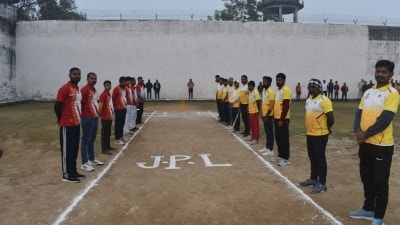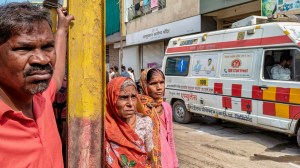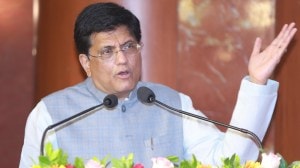A shift in strategy
Congress President Sonia Gandhi is increasingly turning aggressive in her attack against the ruling Bharatiya Janata Party. Her speech in...

Congress President Sonia Gandhi is increasingly turning aggressive in her attack against the ruling Bharatiya Janata Party. Her speech in Mumbai on August 9 and her remarks last week urging party members to be ready for any eventuality are pre-emptive strikes to nip in the bud any movement the BJP may make to break a group from the Congress.
This is not likely to happen if Sonia is willing to head a government in the event of the fall of the Vajpayee ministry. But it cannot be ruled out, if the MPs sense an election.
Her words do not mean the Congress is now set to topple the BJP government. But the Congress chief has given a clear signal to her party members and to potential allies that were the situation to arise, she is not averse to assuming the responsibility of forming a government.
Making this clear had become necessary 8212; she had to tell MPs that elections were not inevitable in the event of the fall of the BJP government as also to enthuse partymen to work hard for the elections due in fourAssemblies 8212; Madhya Pradesh, Delhi, Rajasthan and Mizoram.
Sharad Pawar had hinted some days ago that the Congress was not ready to form a government this has apparently also been Sonia8217;s own thinking, and that the end of the BJP government would lead to instability and chaos.
Sonia8217;s words 8212; 8220;At any moment we might be called upon to assume responsibilities8221; 8212; mark a significant shift in the party8217;s stand. They are also an admission that events 8212; and not individuals or parties 8212; will determine the political timetable.
An expression of reluctance to assume power is an important political weapon in her hands. Her unwillingness to take over the reins of the Congress for seven years after her husband8217;s death increased her acceptability. Her reluctance now to rush into forming an alternative government, is in fact an attempt to try and do it on her terms, and tire out the likes of Jayalalitha, Mulayam Singh Yadav and Laloo Prasad Yadav so that they are in a better frame of mind to cooperate..
Shehas personally been talking to Mulayam, Laloo, Jyoti Basu, Harkishen Singh Surjeet, Indrajit Gupta and A.B. Bardhan. Margaret Alva is in constant touch with Jayalalitha. But Congress leaders are under no illusions about the problems of dealing with the regional satraps. The support the Yadav chieftains gave Sushma Swaraj8217;s Prasar Bharati Bill in the Lok Sabha was meant to be a warning to the Congress 8212; they are not willing to allow the Congress to take them for granted.
But Sonia also realises the pitfalls of remaining reluctant. It could leave the field open for others. The determination of MPs across the board to avert a poll could lead to a realignment of political forces, not leaving the Congress untouched.
So far, Sonia Gandhi had given the impression that she is in no hurry to topple the BJP. Congressmen assessed that she would like to give the BJP more time to discredit itself, and allow herself the chance to consolidate her position before she decides to go for the kill. At her two tea meetingswith Vajpayee she is believed to have told the Prime Minister that she was interested in rebuilding the Congress.
But now, in preparation for what is to come, her attacks on the government have acquired a stridency. She hit the road on the issue of prices and dubbed the monsoon session of Parliament as 8220;most unproductive8221;.
Sonia is not known for off-the-cuff remarks. She is precise with words, and cautious to a fault. She is known to get inputs from her 8220;think tanks8221; before she makes up her mind.
But events are moving rapidly with the contradictions within the ruling alliance getting sharper. The BJP8217;s alliance with its partners is loosening and this became abundantly clear in the just concluded Budget session. Yet they are not sure that the Congress is ready to head an alternative arrangement.
Mamata Banerjee, Jayalalitha and the likes of Abdul Ghafoor from the Samata Party favoured P.M. Sayeed of the Congress for Deputy Speaker of the Lok Sabha. But the defeat of the BJP candidate would havemeant the beginning of the end for the government. The allies told the Congress that since it was not ready to form an alternative government, they did not want to risk bringing down the Vajpayee ministry. With uncertainty on both sides about the consequences of the election, Mamata8217;s formula to defer the poll became acceptable to all. The resignation of Abrar Ahmad from the primary membership of the BJP, and growing restiveness amongst the other 8220;new recruits8221; who had joined the party before elections putting the Congress at a disadvantage, is also bad news for the party.
However, there is an apprehension in Congress circles that the conflict in Jammu amp; Kashmir might escalate in the coming weeks and that the BJP might try and use the situation to consolidate its otherwise shaky position by resorting to adventurism. These fears have also increased pressures on Sonia Gandhi to advance her timetable.
Even when it is ready, the Congress strategy is not to be seen to be toppling the BJP government thistime, and Sonia underscored the point when she said the instability of the government stemmed not from anything done by the Opposition but by the quarrels within its own ranks. Having pulled down the governments of H.D. Deve Gowda and Inder Gujral, it is being extra careful this time as it does not want to be held responsible for the fall of yet another government, knowing that people are getting fed up with frequent elections.
- 01
- 02
- 03
- 04
- 05































